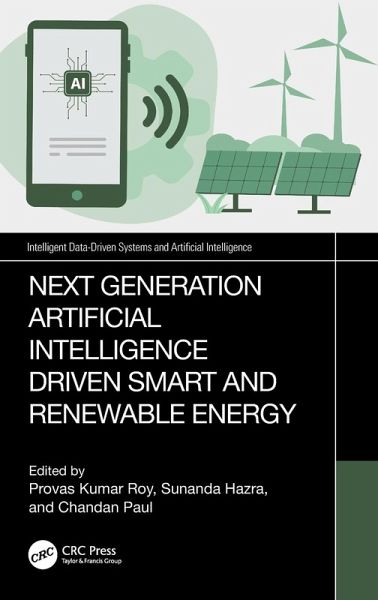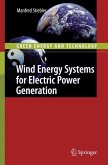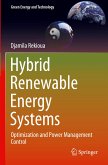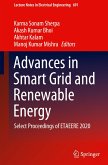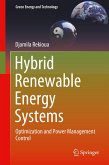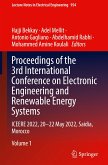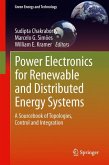Next Generation Artificial Intelligence Driven Smart and Renewable Energy
Herausgeber: Paul, Chandan; Hazra, Sunanda; Roy, Provas Kumar
Next Generation Artificial Intelligence Driven Smart and Renewable Energy
Herausgeber: Paul, Chandan; Hazra, Sunanda; Roy, Provas Kumar
- Gebundenes Buch
- Merkliste
- Auf die Merkliste
- Bewerten Bewerten
- Teilen
- Produkt teilen
- Produkterinnerung
- Produkterinnerung
This book provides practical challenges encountered, solutions and future scope to be adopted in the fields of renewable energy. Applications of varieties advanced optimization and AI techniques on design and development of renewable energy integrated systems have been discussed.
Andere Kunden interessierten sich auch für
![Wind Energy Systems for Electric Power Generation Wind Energy Systems for Electric Power Generation]() Manfred StieblerWind Energy Systems for Electric Power Generation110,99 €
Manfred StieblerWind Energy Systems for Electric Power Generation110,99 €![Hybrid Renewable Energy Systems Hybrid Renewable Energy Systems]() Djamila RekiouaHybrid Renewable Energy Systems74,99 €
Djamila RekiouaHybrid Renewable Energy Systems74,99 €![Advances in Smart Grid and Renewable Energy Advances in Smart Grid and Renewable Energy]() Advances in Smart Grid and Renewable Energy221,99 €
Advances in Smart Grid and Renewable Energy221,99 €![Hybrid Renewable Energy Systems Hybrid Renewable Energy Systems]() Djamila RekiouaHybrid Renewable Energy Systems103,99 €
Djamila RekiouaHybrid Renewable Energy Systems103,99 €![Innovations in Renewable Energies Offshore Innovations in Renewable Energies Offshore]() Innovations in Renewable Energies Offshore306,99 €
Innovations in Renewable Energies Offshore306,99 €![Proceedings of the 3rd International Conference on Electronic Engineering and Renewable Energy Systems Proceedings of the 3rd International Conference on Electronic Engineering and Renewable Energy Systems]() Proceedings of the 3rd International Conference on Electronic Engineering and Renewable Energy Systems274,99 €
Proceedings of the 3rd International Conference on Electronic Engineering and Renewable Energy Systems274,99 €![Power Electronics for Renewable and Distributed Energy Systems Power Electronics for Renewable and Distributed Energy Systems]() Power Electronics for Renewable and Distributed Energy Systems148,99 €
Power Electronics for Renewable and Distributed Energy Systems148,99 €-
-
-
This book provides practical challenges encountered, solutions and future scope to be adopted in the fields of renewable energy. Applications of varieties advanced optimization and AI techniques on design and development of renewable energy integrated systems have been discussed.
Hinweis: Dieser Artikel kann nur an eine deutsche Lieferadresse ausgeliefert werden.
Hinweis: Dieser Artikel kann nur an eine deutsche Lieferadresse ausgeliefert werden.
Produktdetails
- Produktdetails
- Verlag: Taylor & Francis Ltd
- Seitenzahl: 264
- Erscheinungstermin: 15. Juni 2025
- Englisch
- Abmessung: 234mm x 156mm
- ISBN-13: 9781032761565
- ISBN-10: 1032761563
- Artikelnr.: 72737751
- Herstellerkennzeichnung
- Libri GmbH
- Europaallee 1
- 36244 Bad Hersfeld
- 06621 890
- Verlag: Taylor & Francis Ltd
- Seitenzahl: 264
- Erscheinungstermin: 15. Juni 2025
- Englisch
- Abmessung: 234mm x 156mm
- ISBN-13: 9781032761565
- ISBN-10: 1032761563
- Artikelnr.: 72737751
- Herstellerkennzeichnung
- Libri GmbH
- Europaallee 1
- 36244 Bad Hersfeld
- 06621 890
Provas Kumar Roy received the BE degree in Electrical Engineering from R.E. College, Durgapur, Burdwan, India in 1997; ME degree in Electrical Machine from Jadavpur University, Kolkata, India in 2001 and Ph.D. from NIT Durgapur in 2011. Presently he is working as Professor at the department of Electrical Engineering, Kalyani Government Engineering College, Kalyani, India. He has published more than 140 research papers in international journals, 65 conferences paper, 15 book chapters and Scopus citation is nearly 4700 with H-index of 40. His field of research interest includes Economic Load Dispatch, Optimal Power flow, FACTS, Unit Commitment, Radial Distribution System, State Estimation, Automatic Generation Control, Power System Stabilizer and Evolutionary computing techniques. He has supervised 12 Ph.D. scholars in the domain of the power system analysis with high penetration of renewable energy, image processing. He has been placed among "World Ranking of top 2% Scientists" for last three consecutive years in the field of Energy by Stanford University scientists. He has been awarded many times with outstanding reviewer awards, top scientist awards, top peer reviewer awards, best paper awards. He has also contributed as committee member of several national and international conferences. He is a member of the Institute of Engineers and Indian Society of Technical Education (ISTE). He is a regular reviewer of leading journals including Elsevier, IET and IEEE Transactions/journals. Sunanda Hazra received the Ph.D. degree in Electrical Engineering. He is presently associated with Electrical Engineering Department of Haldia Institute of Technology, Haldia, W.B, India. He has ten years of teaching experience. He has published around 20 research papers in International Journals and conference records. His research interest includes load dispatch, hydrothermal scheduling, renewable energy, optimization techniques, etc. He has been awarded with Young Scientist from VD Good Technology Factory in 2021. He has reviewed few research works submitted to National/International Journals. He has attended & organized several short-term courses/faculty development programmes. He is a member of IEI. Chandan Paul received B. Tech degree in Electrical Engineering from Dr. B. C. Roy Engineering College, Durgapur (under West Bengal University of Technology), India, in 2006 and an M. Tech degree from National Institute of Technology, Durgapur, West Bengal, India in Electrical Engineering (specialisation of Electrical System) in 2012. He obtained PhD in Electrical Engineering from IIT (ISM) Dhanbad in 2022. He has eight Journals published in reputed SCI and Scopus indexed Journals. His area of research includes hydro-thermal scheduling, optimal power flow, combined heat and power dispatch and evolutionary algorithms. He has three international journals. He is working as an Assistant Professor in the Department of Electrical Engineering, Dr. B.C. Roy Engineering College, Durgapur, India
1. Renewable Energy: Opportunities, Applications, and Future Scope of
Artificial Intelligence and Internet of Things. 2. Machine
Learning-Enhanced Maximum Power Point Tracking for Solar Modules in
Photovoltaic Systems. 3. An Alternative Approach to the Modeling of
Harmonic Impedance of a Salient Pole Synchronous Generator. 4. Neuro-Fuzzy
Based Optimization Techniques. 5. OPF Incorporating FACTS Tools with
Renewable Energy by GWA. 6. Solving of Combined Heat and Power Economic
Dispatch Problem Using Evolutionary Technic Considering Prohibited
Operating Zone. 7. Integrated Modeling and Fabrication of Electric Vehicle
for Multi-Criteria Framework-Based Racing Frontier Ecosystems. 8.
Application of Artificial Intelligence in Wind Energy Generation. 9.
Governing and Empowering Independent Power Producers in South Africa. 10.
DQ Current Control Strategies for Single-Phase Grid-Connected Inverter. 11.
Chaotic Quasi-Oppositional Differential Search Algorithm for Transient
Stability Constraint Optimal Power Flow Problem. 12. Illuminating the Path
to a Sustainable Future by Harnessing AI-Powered Renewable Energy Systems.
Artificial Intelligence and Internet of Things. 2. Machine
Learning-Enhanced Maximum Power Point Tracking for Solar Modules in
Photovoltaic Systems. 3. An Alternative Approach to the Modeling of
Harmonic Impedance of a Salient Pole Synchronous Generator. 4. Neuro-Fuzzy
Based Optimization Techniques. 5. OPF Incorporating FACTS Tools with
Renewable Energy by GWA. 6. Solving of Combined Heat and Power Economic
Dispatch Problem Using Evolutionary Technic Considering Prohibited
Operating Zone. 7. Integrated Modeling and Fabrication of Electric Vehicle
for Multi-Criteria Framework-Based Racing Frontier Ecosystems. 8.
Application of Artificial Intelligence in Wind Energy Generation. 9.
Governing and Empowering Independent Power Producers in South Africa. 10.
DQ Current Control Strategies for Single-Phase Grid-Connected Inverter. 11.
Chaotic Quasi-Oppositional Differential Search Algorithm for Transient
Stability Constraint Optimal Power Flow Problem. 12. Illuminating the Path
to a Sustainable Future by Harnessing AI-Powered Renewable Energy Systems.
1. Renewable Energy: Opportunities, Applications, and Future Scope of
Artificial Intelligence and Internet of Things. 2. Machine
Learning-Enhanced Maximum Power Point Tracking for Solar Modules in
Photovoltaic Systems. 3. An Alternative Approach to the Modeling of
Harmonic Impedance of a Salient Pole Synchronous Generator. 4. Neuro-Fuzzy
Based Optimization Techniques. 5. OPF Incorporating FACTS Tools with
Renewable Energy by GWA. 6. Solving of Combined Heat and Power Economic
Dispatch Problem Using Evolutionary Technic Considering Prohibited
Operating Zone. 7. Integrated Modeling and Fabrication of Electric Vehicle
for Multi-Criteria Framework-Based Racing Frontier Ecosystems. 8.
Application of Artificial Intelligence in Wind Energy Generation. 9.
Governing and Empowering Independent Power Producers in South Africa. 10.
DQ Current Control Strategies for Single-Phase Grid-Connected Inverter. 11.
Chaotic Quasi-Oppositional Differential Search Algorithm for Transient
Stability Constraint Optimal Power Flow Problem. 12. Illuminating the Path
to a Sustainable Future by Harnessing AI-Powered Renewable Energy Systems.
Artificial Intelligence and Internet of Things. 2. Machine
Learning-Enhanced Maximum Power Point Tracking for Solar Modules in
Photovoltaic Systems. 3. An Alternative Approach to the Modeling of
Harmonic Impedance of a Salient Pole Synchronous Generator. 4. Neuro-Fuzzy
Based Optimization Techniques. 5. OPF Incorporating FACTS Tools with
Renewable Energy by GWA. 6. Solving of Combined Heat and Power Economic
Dispatch Problem Using Evolutionary Technic Considering Prohibited
Operating Zone. 7. Integrated Modeling and Fabrication of Electric Vehicle
for Multi-Criteria Framework-Based Racing Frontier Ecosystems. 8.
Application of Artificial Intelligence in Wind Energy Generation. 9.
Governing and Empowering Independent Power Producers in South Africa. 10.
DQ Current Control Strategies for Single-Phase Grid-Connected Inverter. 11.
Chaotic Quasi-Oppositional Differential Search Algorithm for Transient
Stability Constraint Optimal Power Flow Problem. 12. Illuminating the Path
to a Sustainable Future by Harnessing AI-Powered Renewable Energy Systems.

